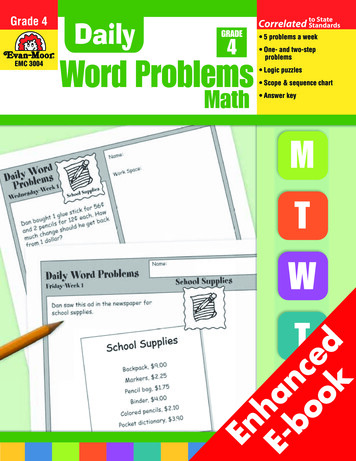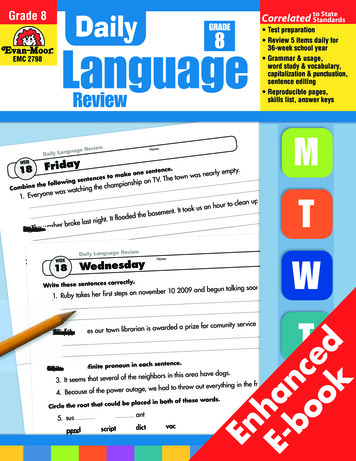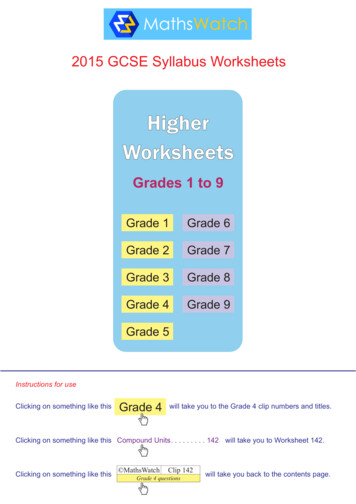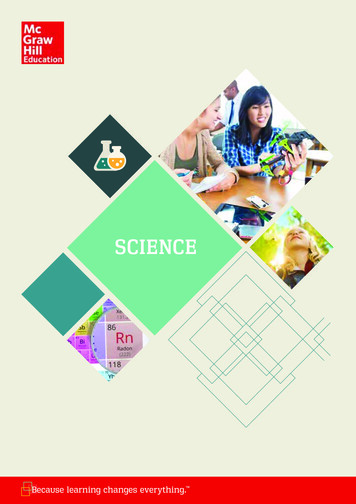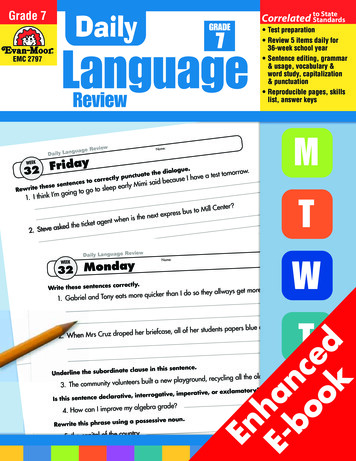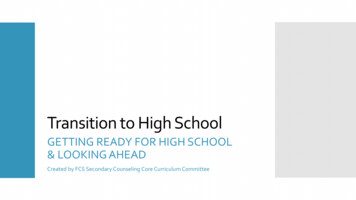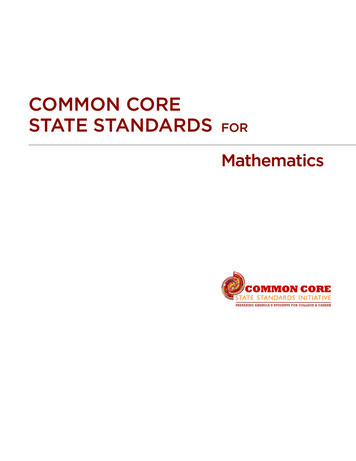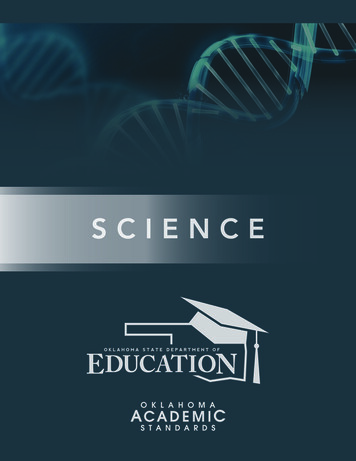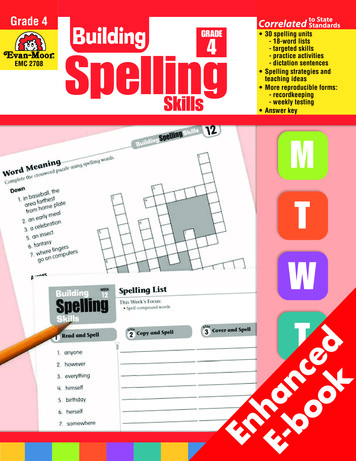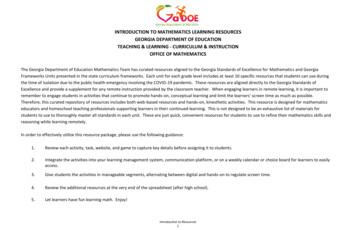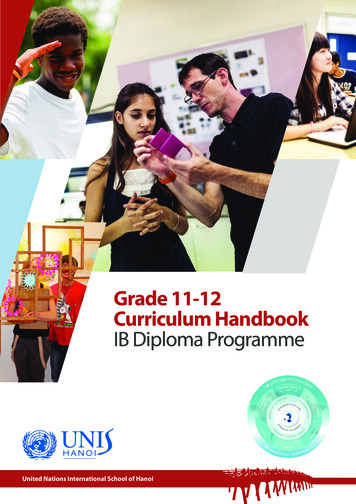
Transcription
Grade 11-12Curriculum HandbookIB Diploma ProgrammeUnited Nations International School of HanoiIB Diploma Programme 2014 - 2016 1
VALUES & BELIEFSBecause UNIS Hanoi values LEARNING, UNIS Hanoi believesthat we: Learn, think and reflect critically in an inspiring environment,using a dynamic curriculum that exceeds internationalstandards; Use and apply knowledge in the classroom and beyondfor life-long personal development, as we strive for happy,balanced lives; Question and research collaboratively to seek innovativesolutions for local and global issues.Because UNIS Hanoi values COMMUNITY, UNIS Hanoi believesthat we: Pro-actively connect with others to make supportive,long-lasting and diverse friendships; Take action to create a safe, caring, and sustainableenvironment; Respect and appreciate diverse cultures, beliefs andlanguages to deepen our understanding of local andglobal issues.Because UNIS Hanoi values RESPONSIBILITY, UNIS Hanoibelieves that we: Act with integrity to make and defend reasoned decisionsbased on respect, compassion and fairness; Take ownership and are accountable for our thoughts,actions and their consequences; Face challenges with courage, resilience and anindependent spirit, whilst remaining responsive andadaptable to change.MISSION & GUIDING PRINCIPLES“Our mission is to encourage students to be independent,lifelong learners who strive for excellence and becomeresponsible stewards of our global society and naturalenvironment, achieved within a supportive community thatvalues diversity and through a programme reflecting theideals and principles of the United Nations.”The United Nations principles as applied to the school are to: Promote peaceful solutions to problems. Develop friendly relations among children and adults ofdifferent nationalities. Promote cooperation in problem solving in economic,social, cultural, and humanitarian matters. Encourage respect for fundamental freedoms andequality for all, without distinction as to race, sex,language or religion.VISION“Our learning community will be an inspirational role modelfor a better world”2 Grade 11-12 Curriculum Handbook
IB Learner ProfileThe aim of all IB programmes is to develop internationallyminded people who, recognizing their common humanityand shared guardianship of the planet, help to create a betterand more peaceful world. The IB learner profile represents 10attributes valued by the IB and UNIS Hanoi.As IB learners we strive to be:INQUIRERSOPEN-MINDEDKNOWLEDGEABLECARINGWe nurture our curiosity, developing skills for inquiry andresearch. We know how to learn independently and withothers. We learn with enthusiasm and sustain our love oflearning throughout life.We develop and use conceptual understanding, exploringknowledge across a range of disciplines. We engage withissues and ideas that have local and global significance.THINKERSWe use critical and creative thinking skills to analyse andtake responsible action on complex problems. We exerciseinitiative in making reasoned, ethical decisions.COMMUNICATORSWe express ourselves confidently and creatively in more thanone language and in many ways.We collaborate effectively, listening carefully to theperspectives of other individuals and groups.PRINCIPLEDWe act with integrity and honesty, with a strong sense offairness and justice, and with respect for the dignity andrights of people everywhere.We take responsibility for our actions and their consequences.We critically appreciate our own cultures and personalhistories, as well as the values and traditions of others. Weseek and evaluate a range of points of view, and we are willingto grow from the experience.We show empathy, compassion and respect.We have a commitment to service, and we act to make apositive difference in the lives of others and in the worldaround us.RISK-TAKERSWe approach uncertainty with forethought and determination;we work independently and cooperatively to explore newideas and innovative strategies. We are resourceful andresilient in the face of challenges and change.BALANCEDWe understand the importance of balancing differentaspects of our lives—intellectual, physical, and emotional—to achieve well-being or ourselves and others. We recognizeour interdependence with other people and with the worldin which we live.REFLECTIVEWe thoughtfully consider the world and our own ideasand experience. We work to understand our strengths andweaknesses in order to support our learning and personaldevelopment.IB Diploma Programme 2014 - 2016 3
Table of ContentsUNIS HANOI VALUES, MISSION & VISIONIB Learner ProfileBACKGROUNDINTERNATIONAL BACCALAUREATE DIPLOMAPROGRAMMEIB DIPLOMA PROGRAMME SUBJECTSIB DIPLOMA PROGRAMME CORE REQUIREMENTSAward of the IB Diploma235556GROUP 4: EXPERIMENTAL SCIENCEBiologyChemistryPhysicsComputer ScienceEnvironmental Systems and Societies (ESS)(available at SL only)2729313334SUBJECTS OFFEREDAT UNIS HANOIGROUP 5- MATHEMATICSMathematics (HL)Mathematics (SL)Mathematical Studies (SL)353637GROUP 1- STUDIES IN LANGUAGE ANDLITERATURELanguage A- LiteratureLanguage A - Language and LiteratureSelf-Taught Language A: Literature81012GROUP 6- THE ARTSTheatreFilmMusicVisual Arts38394042Group 2- Language AquisitionLanguage BLanguage ab initio (available at SL only)1416THEORY OF KNOWLEDGE, EXTENDED ESSAY ANDCreativity, Action and Service (CAS)Theory of Knowledge (TOK)Extended EssayPoints Calculation for TOK and Extended EssayCreativity, Action and Service (CAS)44444445GROUP 3- INDIVIDUALS AND SOCIETIESEconomicsHistoryPsychologyBusiness and ManagementEnvironmental Systems and Societies (ESS)(available at SL only)4 Grade 11-12 Curriculum Handbook1820222425
BackgroundInternationalBaccalaureate DiplomaProgrammeThe International Baccalaureate Diploma Programme (IBDP)is an academically and personally challenging two-year preuniversity course. It provides students of different linguistic,cultural and educational backgrounds with the self-awarenessand the intellectual, social and critical perspectives that willbe necessary for the adult world. The IBDP is a high-qualityprogramme, designed and monitored by educationalists anddrawn from the best practices of education systems in manycountries. It is highly respected by schools and universitiesthroughout the worldIB Diploma ProgrammesubjectsThe IBDP involves choosing three subjects to study in detailat Higher Level (HL) and three subjects at Standard Level (SL).Students must select six subjects by choosing one from eachof the groups.IB Diploma Programmecore requirementsIn addition, the programme has three core requirementsthat are included to broaden the educational experienceand challenge students to apply their knowledge andunderstanding. They contribute to the unique nature of theIBDP, with compulsory participation required in:1. Creativity, Action and Service (CAS).2. The Extended Essay, which demands independent researchunder appropriate guidance.3. Theory of Knowledge, which explores the relationshipbetween the disciplines and ensures that students engage incritical reflection about knowledge and experience acquiredboth within and beyond the classroom.All IBDP subjects have a balance of coursework that isexternally assessed by examination and internally assessedwork that is externally moderated. The proportion of the finalgrade determined by each varies amongst subjects.IB Diploma Programme 2014 - 2016 5
Award of the IB DiplomaBelow is a selection of some IBDP rules relating to the IBdiploma. Performance in each of the six IB diploma subjects isgraded on a scale of 1 point (minimum) to 7 points(maximum).A maximum of 3 points is awarded for combinedperformance in Theory of Knowledge and the ExtendedEssay. (see bonus points matrix)The maximum total Diploma Programme point score istherefore 45.Submission of an Extended Essay and the Theory ofKnowledge components is compulsory for award of thediploma.Levels of awardFrom the May 2015 examination sessionFrom the May 2015 session the following failing conditionsand associated codes will replace those in current use.1.2.3.4.5.6.7.8.9.CAS requirements have not been met.Candidate’s total points are fewer than 24.An N has been given for theory of knowledge, extendedessay or for a contributing subject.A grade E has been awarded for one or both of theory ofknowledge and the extended essay.There is a grade 1 awarded in a subject/level.Grade 2 has been awarded three or more times (HL or SL).Grade 3 or below has been awarded four or more times(HL or SL).Candidate has gained fewer than 12 points on HLsubjects (for candidates who register for four HL subjects,the three highest grades count).Candidate has gained fewer than 9 points on SL subjects(candidates who register for two SL subjects must gain atleast 5 points at SL).A maximum of three examination sessions is allowed in whichto satisfy the requirements for the award of the IB Diploma.6 Grade 11-12 Curriculum Handbook
When planning an IBDP course, students should bear thefollowing in mind: The same subject cannot be taken at both HL and SL The same language cannot be taken in both Group 1 andGroup 2 The IB, at its discretion, occasionally gives specialpermission for three sciences to be taken if the studentconcerned has no choice but to do this for universityentrance. Documentary evidence of such a requirementmust be given to the IBDP coordinator who will forwardit to the IB Office and request permission. The IBDP willnot allow three sciences to be taken without this writtenevidence A student who is bilingual may take two Language Acourses SL subject availability is not guaranteed; if insufficientnumbers of students opt for a subject it may not beoffered or if the class is already full, students may not beable to choose the subjectSchool Diploma. These students may apply to universities asa US High School Diploma-holder and are often eligible fordirect entry to Australian, Canadian, Dutch, Korean, UK, andUS universities. Students will, however, often need to meetminimum grade and testing requirements (such as the SAT).Some universities may require that students first complete afoundation programme before being granted direct entry tocertain courses.IB Diploma recognition by universitiesInternational recognition of the IB Diploma Programmeis outlined on the IB’s website, www.ibo.org/diploma/recognition.We strongly encourage all students to check university IBrecognition policies for individual countries on this website.Students intending to study at Dutch, French, German,Italian, Swiss, or Asian universities must check country anduniversity-specific requirements when selecting Diplomasubjects, because these countries tend to have specialrequirements.IB Diploma Course candidates andIBDP Course CertificatesInstead of taking a full IB Diploma, students may opt to takeIBDP examinations in any of the individual subject courses.They will receive IBDP course certificates.Students who take IB Diploma Courses instead of the full IBDiploma Programme will graduate with a UNIS Hanoi HighIB Diploma Programme 2014 - 2016 7
Group 1- Studies in Language and LiteratureGroup 1 courses meet the requirements of students whoseLanguage A is their strongest language, while taking intoaccount that many students have complex language profilesand maybe be bi- or tri-lingual. While the courses aredifferent, they both develop understanding about languageand literature and are designed to support future study bydeveloping language skills.Language A- LiteratureCourse content: Language A - LiteratureAvailable in Vietnamese, Korean and EnglishLiterature HLThis course is designed for the student with a definiteinclination towards the study of literature and who mayintend to continue such studies beyond the Diplomalevel. The course focuses on in-depth literary analysis andappreciation in both oral and written capacity. Students willbe required to write essays, conduct independent researchand participate in informal and formal orals for internal andexternal assessment. The total number of texts studied overthe two years is 13, including 3 World Literature works, whichare read in translation.Literature SLThis course is designed for students who desire someenrichment in the study of literature, but who may not havesuch a definite inclination towards the study of literature, orwho may be considering options for such study beyond theDiploma level. Most of the course is studied along with HLstudents to the same depth. The courses differ in the numbersof texts covered and the types of assessment. This course willappeal to those who enjoy literary study, but who also wish topursue other subject areas at HL instead. The total number oftexts studied is 10, including 3 World Literature works, whichare read in translation.8 Grade 11-12 Curriculum Handbook
Assessment SLAssessment ComponentAssessment HLWeightingAssessment ComponentWeightingExternal assessment (3 hours)70%External assessment (4 hours)Paper 1: Guided literary analysis(1 ½ hours)The paper consists of two passages: one proseand one poetry.Students choose one and write a guidedliterary analysis in response to two questions.(20 marks)20%Paper 1: Literary Commentary (2 hours)– 20%The paper consists of two passages: oneprose and one poetry.Students choose one and write a literarycommentary. (20 marks)Paper 2: Essay (1 ½ hours)The paper consists of three questions for eachliterary genre. In response to one question,students write an essay based on at least twoworks studied in Part 3. (25 marks)25%Written AssignmentStudents submit a reflective statement andliterary essay on one work studied in Part 1(25 marks). The reflective statement must be300-400 words in length. The essay must be1,200-1,500 words in length.25%Written AssignmentStudents submit a reflective statement andliterary essay on one work studied in Part 1(25 marks). The reflective statement mustbe 300-400 words in length. The essay mustbe 1,200-1,500 words in length.25%Internal assessment30%Internal assessment30%This component is internally assessed bythe teacher and externally moderated bythe IB at the end of the course.Individual oral commentary (10 minutes)Students give an oral commentary andanswer subsequent questions on an extractfrom a work studied in Part 2. (poetry/prose)(30 marks)Individual oral presentation (10-15minutes)The presentation is based on works studiedin Part 4. It is internally assessed andexternally moderated through the Part 2internal assessment task. (30 marks)Paper 2: Essay (2 hours)The paper consists of three questions foreach literary genre. In response to onequestion students write an essay basedon at least two works studied in Part 3. (25marks)70%20%25%This component is internally assessed bythe teacher and externally moderated bythe IB at the end of the course.15%15%Individual oral commentary anddiscussion (20 minutes)Formal oral commentary on poetry studiedin Part 2 with subsequent questions (10minutes) followed by a discussion based onone of the other Part 2 works (10 minutes).(30 marks)15%Individual oral presentation (10-15minutes)The presentation is based on works studiedin Part 4. It is internally assessed andexternally moderated through the Part 2internal assessment task. (30 marks)15%IB Diploma Programme 2014 - 2016 9
Language A - Language and LiteratureCourse content: Language A - Language andLiteratureEnglish A: Language and Literature HLThis course requires students to be either native or very nearnative speakers of English in terms of both their oral andwritten skills, and will appeal to students who may be lessinclined towards a course focused solely on literary study.Students study six literary works in addition to exploringvarious aspects of Language in Cultural Context andLanguage and Mass Communication. A range of oral, writtenand visual materials is studied from a variety of non-literarysources, genres and media. Students will be required to writeessays for both internal and external assessment, conductindependent research and participate in informal and formaloral and written critiques.English A: Language and Literature SLThis course requires students to be either native or very nearnative speakers of English in terms of both their oral andwritten skills and will appeal to students who may be less10 Grade 11-12 Curriculum Handbookinclined towards a course focused solely on literary study.Students study four literary works in addition to exploringvarious aspects of Language in Cultural Context andLanguage and Mass Communication. A range of oral, writtenand visual materials is studied from a variety of non-literarysources, genres and media. Students will be required to writeessays for both internal and external assessment, conductindependent research and participate in informal and formaloral and written critiques.Skills developedAbility to express ideas clearly and with fluency orally and inwritingAbility to substantiate and justify ideas with relevantexamplesAbility to evaluate conflicting viewpointsUnderstanding of the ways cultural values are expressed intextsUnderstanding of text structures, style and the writer’stechniqueAbility to compare and contrast the form, style and contentof textsUnderstanding of individual literary works as representativesof genre and period.
Assessment SLAssessment ComponentAssessment HLWeightingAssessment ComponentWeightingExternal assessment (3 hours)70%External assessment (4 hours)70%Paper 1: Textual analysis (1 ½ hours)The paper consists of two unseen texts.Students write an analysis of one the thesetexts (20 marks).25%Paper 1: Textual analysis (2 hours)The paper consists of two pairs of unseentexts. Students write a comparative analysisof one pair of texts (20 marks).25%Paper 2: Essay (1 ½ hours)In response to one of six questions studentswrite an essay based on both the literarytexts studied in Part 3. The questions arethe same at HL but the assessment criteriaare different (25 marks).25%Paper 2: Essay (2 hours)In response to one of six questions studentswrite an essay based on at least two of theliterary texts studied in Part 3. The questionsare the same at SL but the assessmentcriteria are different (25 marks).25%Written TaskStudents produce at least three writtentasks based on material studied in thecourse. Students submit one written taskfor external assessment (20 marks). Thistask must be 800-1000 words in length plusthe rationale of 200-300 words.20%20%Internal assessment30%Written TaskStudents produce at least four written tasksbased on material studied in the course.Students submit two of these tasks forexternal assessment (20 marks for eachtask). One of the tasks submitted must bea critical response to one of the prescribedquestions for the HL additional study. Thistask must be 800-1,000 words in lengthplus the rationale of 200-300 words.Internal assessment30%This component is internally assessed bythe teacher and externally moderated bythe IB at the end of the course.Individual oral commentaryStudents comment on an extract from aliterary text studied in Part 4 of the course(30 marks). Students are given two guidingquestions.15%Further oral activityStudents complete at least two furtheroral activities, one based on Part 1 and onebased on Part 2 of the course. The mark ofone further oral activity is submitted forfinal assessment (30 marks)15%This component is internally assessed bythe teacher and externally moderated bythe IB at the end of the course.Individual oral commentaryStudents comment on an extract from aliterary text studied in Part 4 of the course(30 marks). Students are given two guidingquestions.15%Further oral activityStudents complete at least two furtheroral activities, one based on Part 1 and onebased on Part 2 of the course. The mark ofone further oral activity is submitted forfinal assessment (30 marks).15%IB Diploma Programme 2014 - 2016 11
Self-Taught Language A: LiteratureTo be eligible for the Bilingual Diploma, students may takea Language A: Literature course other than English as a selfsupported subject, even if no teacher of the language isavailable or the number of students is too small to warranta separate class. This option is referred to as the ‘self-taught’option by the IB. It is only available at SL. In past years, UNISHanoi students have studied Danish, Dutch, Italian, Malay,Polish, Portuguese, Russian, and Spanish.Additional supportUNIS Hanoi mandates that parents need to hire a qualifiedLiterature tutor so that the students can benefit fromspecialist feedback in the areas of language skills, academicwriting and cultural content. Tutors also play a vital role inproviding accurate feedback about students’ abilities in thesubject.The school recommends an hour of tutoring per week,depending on the ability level of the student. If the studenthas not had any Language A tuition for an extended periodof time, then more tuition time maybe necessary. Studentsare expected to be literate in the language upon startingthe course as the main focus of the course is literature, notlanguage acquisition. If both the tutor and the student(s)are available during the school day the school may providea classroom for them to meet in person or online (e.g. viaSkype).12 Grade 11-12 Curriculum HandbookCollaboration with tutorsAfter parents have identified the tutor, the self-taughtcoordinator will contact him/her to provide coursedocumentation, deadlines, resources and advice. The tutormust provide the coordinator with information regarding thestudent’s effort, progress and performance. The coordinatorwill incorporate the tutor’s comments into the Language Aacademic report issued by the school.
Skills developedStudents develop the skills of literature analysis (commentaryand essays) and are consequently able to express complexideas in both their (other) Language A and in English.This has valuable intellectual benefits. Students also gainknowledge and insight into their community or origins,which supports their personal development and a possible(re)integration in a country where the Language A is used.Through the independent self-study of literary works in theirown language, students also demonstrate an ability to workindependently and to take responsibility for their studies,which is a quality sought by universities.AssessmentAssessment ComponentWeightingExternal assessment70%Two written examination papers: Paper 1- Guided Literary Analysis Paper 2- Literature Essay Paper Written AssignmentA reflective statement and literary essayon one work studied in Part 1.20%25%25%Alternative oral examination30% 15%15%Individual Oral CommentaryIndividual Oral PresentationBilingual DiplomaThe Bilingual Diploma will be awarded to any student whosuccessfully completes a Language A course in any languageother than English in conjuction with an English A course.Please note that this can be either a Literature or a Languageand Literature course.IB Diploma Programme 2014 - 2016 13
Group 2- Language acquisitionLanguage BLanguage B courses provide students with a high degree ofproficiency in their chosen language and further developtheir understanding of different cultures and ways of life ofthe languages studied.Options: English, French, SpanishCourse contentThe course is designed for students with previous experiencesof learning a foreign language (normally 3-5 years), andis suitable for those who have displayed both ability andinterest in their previous foreign language classes. The syllabifor both HL and SL are similar in content, although HL coursesalso expect students to explore some literary texts.The objective of the Language B course is for students tocommunicate clearly and effectively in different styles andcontexts while studying the cultures associated with thelanguage. Students gain a better understanding and use ofgrammatical structures and vocabulary through studying avariety of topics. These topics all offer a cultural perspectiveand enable students to take part in discussions on a widevariety of issues. Examples of topics include communicationand media, global issues and social relationships. Studentsare encouraged to reflect upon their own perspectives, thoseof the school and those of the target language culture.14 Grade 11-12 Curriculum HandbookSkills developedStudents further develop the four main skills of listening,reading, writing and speaking through studying a variety oftopic areas and carrying out a range of individual and groupwork activities. Examples include: listening: news bulletins, interviews, films, internet speaking: presentations, debates, discussions, role plays reading: news articles, letters, interviews, internet writing: letters to newspapers, film reviews, diary entries,essays.
Assessment SLAssessment HLAssessment ComponentWeightingAssessment ComponentWeightingExternal assessment70%External assessment70%Paper 1 (1 ½ hours): Receptive skillsText handling exercises on four written texts,based on the core.25%Paper 1 (1 ½ hours): Receptive skillsText handling exercises on five writtentexts, based on the core.25%Paper 2 (1 ½ hours): Written productiveskillsOne writing exercise of 250-400 words from achoice of five, based on the options.25%Paper 2 (1 ½ hours): Written productiveskillsTwo compulsory writing exercises: Section A: One task of 250-400 words,based on the options, to be selectedfrom a choice of five. Section B: Response of 150-250 wordsto a stimulus text, based on the core.25%Written assignment: Receptive andwritten productive skillsCreative writing of 500-600 words plus a150-word rationale, based on one of theliterary texts read.20%Internal assessment30%Internal assessment30%Internally assessed by the teacher andexternally moderated by the IB.Internally assessed by the teacher andexternally moderated by the IB.Individual oral (8-10 minutes)Based on the options: 15 minutes ofpreparation time and a 10-minute(maximum) presentation and discussionwith the teacher.20%10%Interactive oral activityBased on the core: Three classroomactivities assessed by the teacher.Individual oral (8-10 minutes)Based on the options: 15 minutes ofpreparation time and a 10- minute(maximum) presentation and discussionwith the teacher.20%10%Interactive oral activityBased on the core: Three classroomactivities assessed by the teacher.IB Diploma Programme 2014 - 2016 15
Language ab initio (available at SL only)The ab initio courses offer students the chance to take upa new language at IBDP and to reach a reasonable level ofcommunication in only two years. This is a good course forstudents who are interested in learning how to communicateeffectively in every situation and for students who have littleor no previous experience of learning a foreign language.All final decisions on the appropriateness of the course forwhich students are entered are taken by coordinators inliaison with teachers, using their experience and professionaljudgment to guide them. The most important considerationis that the language ab initio course should be a challengingeducational experience for the student (IB Language ab initioGuide, 2011).Options are French, Spanish and Mandarin.Course contentThe emphasis is on practical utility and communication.Students will acquire the vocabulary and grammaticalstructures they need to use in everyday social interactionsand situations. The course aims to develop a variety oflinguistic skills and basic awareness of cultures.Students study three themes:1. Individual and society2. Leisure and work3. Urban and rural environmentSkills developedThe Language ab initio course aims to develop the followingskills: Listening: understanding straightforward conversationsand the overall idea of a presentationReading: understanding straightforward informationand skimming to extract key points and ideas in textsWriting: conveying information clearly, organizingideas, giving details and opinions and using languageappropriate to purpose and audienceSpeaking: participating in spontaneous conversations,giving information and opinions clearly in brief structuredpresentations.16 Grade 11-12 Curriculum HandbookAssessment SLAssessment ComponentWeightingExternal assessment75%Paper 1 (1 ½ hours): Receptive skillsUnderstanding of four written texts (40marks). Text- handling exercises30%Paper 2 (1 hour): Productive skillsTwo compulsory writing exercises (25 marks) Section A (7 marks): One question to beanswered from a choice of two Section B (18 marks): One question to beanswered from a choice of three25%Written assignment (2 hours): Receptiveand written productive skillsA piece of writing, 200-300 words, in thetarget language carried out in class underteacher supervision. (20 marks)20%Internal assessment (10 minutes):Interactive skills35%Individual oral (25 marks)Three-part oral internally assessed by theteacher and externally moderated by the IBtowards the end of the course.Part 1: Presentation of visual stimulus (from achoice of two) by the student.Part 2: Follow-up questions on the visualstimulus.Part 3: General conversation including at leasttwo questions on the written assignment.Please note: Mandarin is currently offered as a Pamoja coursewhich is online. There is an additional cost involved in takingthis course
IB Diploma Programme 2014 - 2016 17
Group 3- Individuals and SocietiesAll Group 3 IBDP courses are ab initio, which means you maystart the course without having studied it before.EconomicsEconomics is essentially about the concept of scarcity andthe problem of resource allocation. It is used to understandmany real world problems, such as international trade anddevelopment. Throughout the course students will gainan understanding of the trade-offs between equity andefficiency while studying the role of the free market andgovernment in today’s mixed market economies. In additionto learning to understand and apply current economic theoryand concepts, students will also develop the skills
IB Diploma Programme 2014 - 2016 7 School Diploma. These students may apply to universities as a US High School Diploma-holder and are often eligible for direct entry to Australian, Canadian, Dutch, Korean, UK, and US universities. Students will, however, often need to meet minimum grade and testing requirements (such as the SAT).
